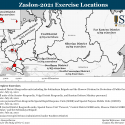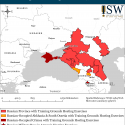Overwatch Podcasts
ISW's Overwatch Podcast features discussions with experts and practitioners to explore challenges and opportunities that lie ahead for the United States.
ISW's Overwatch Podcast features discussions with experts and practitioners to explore challenges and opportunities that lie ahead for the United States.
ISW is closely monitoring the unfolding, dynamic, and complicated events in Belarus and its consequences for US national security and the NATO alliance.
This series of papers explores the ways the United States and its potential adversaries are learning from ongoing geopolitical competition and military engagements.
The United States cannot stabilize—or safely deprioritize—the Middle East without first stabilizing Iraq.

The Taliban’s swift seizure of Kabul has altered key regional states’ calculus toward Afghanistan. Russia, China, Iran, and Turkey are weighing how to take advantage of the United States’ hurried withdrawal while mitigating the new terrorist threats and refugee waves from Afghanistan that will likely follow. All four states will likely recognize the Taliban as the official government of Afghanistan in the coming months. The Taliban’s victory also presents an opportunity for al Qaeda and other Salafi-jihadi groups to expand their havens in Afghanistan and intensify ongoing efforts to inspire terror attacks in the West capitalizing on the 20th anniversary of the September 11th attacks.
Kremlin messaging on Afghanistan since August 15 has balanced praise for the Taliban’s supposedly “peaceful” takeover of Kabul with cautious rhetoric about officially recognizing the Taliban, which is still formally designated as a terrorist organization in Russia. Zamir Kabulov, the Kremlin’s special representative for Afghanistan, stated on August 16 that the Kremlin “prepared the ground ahead of time” to work with “the new government of Afghanistan.” Kabulov said that Russia has retained its embassy in Kabul with security cooperation from the Taliban and praised the Taliban for taking over security in the capital “absolutely peacefully.”

The Russian National Guard (Rosgvardia) demonstrated new capabilities and readiness during its first-ever operational-strategic exercise from July 12 to 30. Rosgvardia conducted Zaslon-2021 as a nationwide exercise and readiness check of its full spectrum of capabilities, not a localized exercise as it originally claimed. Rosgvardia falsely announced in early July that Zaslon-2021, its first strategic exercise since its establishment in 2016, would occur only in the Central, Volga, and Southern federal districts and support preparations for the Russian military’s upcoming Zapad-2021 exercise. Zaslon-2021 instead occurred simultaneously in every Russian federal district except the North Caucasian. Rosgvardia conducted four large-scale exercises involving all Rosgvardia units in the announced Central, Volga, and Southern districts, supported by unannounced small-scale exercises across Russia. Twenty-three of Zaslon’s component exercises occurred in the announced districts, while 42 exercises occurred in other, unannounced districts across Russia.

Russia’s Southern Military District (SMD) announced on August 8 that it is conducting district-wide exercises practicing combined arms operations from August 9 to September 15. The commander of the SMD, General Alexander Dvornikov, said the exercises will contain tactical tasks between motorized rifle, tank, and artillery battalions of the SMD and attached specialized units. The attached specialized units include chemical, biological, radiological, and nuclear defense (CBRN), engineering, electronic warfare, reconnaissance, logistics, medical, military police, army aviation, and transport aviation units. Warships from the Caspian Flotilla and the Black Sea Fleet, naval infantry, and at least 80 fixed and rotary wing aircraft are also participating. SMD Commander Dvornikov will directly oversee the exercises. The Ministry of Defense (MoD) did not state that these exercises were preplanned and did not discuss the exercises before August 8.

Iran likely ordered its Iraqi proxies to sustain low-level, harassing attacks on US forces in Iraq until after the October 2021 parliamentary elections and to return to more lethal attacks toward the end of 2021. Iran is recalibrating its campaign to expel US forces from Iraq following the results of the US-Iraq Strategic Dialogue, during which the United States announced a mostly symbolic withdrawal of all its combat forces from Iraq. Proxies may continue larger-scale attacks on US forces in Syria before October and may also expand their attacks to target US aircraft, bases, and allies throughout the Middle East.